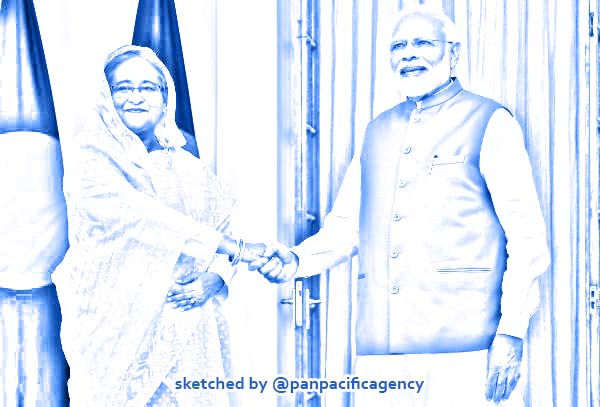India to focus ‘connectivity’ for next 20 years ties with Bangladesh

India's Prime Minister Narendra Modi shakes hands with his Bangladeshi counterpart Sheikh Hasina before their meeting at Hyderabad House in New Delhi, India, 5 October 2019 (Photo: Reuters/Altaf Hussain). Sketched by the Pan Pacific Agency.
DHAKA, Mar 6, 2021, The Bangladesh Today. Indian External Affairs Minister Dr S Jaishankar today said India was keen to take as its major focus the India-Bangladesh connectivity issue for next 20 years to change the region’s geo-economic scenario, The Bangladesh Today reported.
“Fifty years (of Indian-Bangladesh bilateral relations) are over, think for, no not fifty years think next twenty years,” he said emerging along with his counterpart Dr AK Abdul Momen to a joint media briefing following their one and half hours of talks.
Jaishankar added: “I would say most of all let us look at connectivity . . . I would pick connectivity as a big goal (for our relationship).”
The top Indian diplomat said they talked about involving a third country, preferably Japan, to be a major stakeholder in the bilateral engagement in terms of connectivity as both Dhaka and New Delhi were having “very good” relations with Tokyo.
“Japan is involved (as well) in connectivity projects in the Bay of Bengal (region),” he said.
Jaishankar said: “I can tell you the whole geo-economics of the region will change, the Bay of Bengal will look very different.”
Momen said during the talks “we have committed to continue to work together to take our bilateral relations to newer heights under the leadership of two honorable Prime Ministers Sri Narendra Modi and Sheikh Hasina”.
The Bangladesh foreign minister said the two sides discussed a wide range of ongoing bilateral issues including Covid-19 cooperation, connectivity, trade, water, security, border and lines of credit.
“We focused on possible ways to materialize our commitments and how to prioritize and accommodate each other’s priorities in a mutually beneficial manner,” he said.
Jaishankar arrived here this morning for a daylong trip to set agenda of the Indian premier’s planned upcoming visit on March 26-27.
“Of course, preparations for the visit of Hon’ble Prime Minister Modi to Bangladesh at the end of this month has been a key element of our discussions,” Momen said replying to a related question.
He said Dhaka was happy with Modi’s plan to join the celebrations of Father of the Nation Bangabandhu Sheikh Mujibur Rahman’s birth centenary that coincided with Golden Jubilee of Bangladesh’s independence and 50 years of Bangladesh-India diplomatic relations.
The Indian foreign minister said from New Delhi’s perspective viewpoint, matters related to people to people contact, education, health and culture immediately followed the connectivity issue and “I think we should have a much more people-led relationship”.
“I am very convinced that would actually give an additional impetus to our cooperation,” he said.
Jaishankar said there is no domain where Bangladesh and India were not working today but yet New Delhi envisaged numerous possibilities in bilateral ties.
“Our relationship is really 360 … and the more we do the more possibilities open up,” he said.
“When I lookup India Bangladesh ties .. I see economic possibilities, I see huge connectivity possibilities, I see a lot of people to people possibilities,” he said.
“Our relationship is really 360 … and the more we do the more possibilities open up,” he said.
Jaishankar appeared happy particularly over the Dhaka-Delhi cooperation on the COVID-19 pandemic and economic recovery endeavors while he pointed out Bangladesh was the only foreign country where India shipped nine million vaccine doses — the largest volume of inoculates so far, produced in its Seram Institute.
Momen acknowledged India’s collaborative approach in combating the pandemic ongoing pandemic as Bangladesh has purchased the COVID vaccine from Serum Institute of India.
Asked for comments about border killing, a major irritant in bilateral relations, he said every death along her frontier is regrettable while some of such casualties were taking place inside India.
“Every death is regrettable . . . But the problem is because of crime. So our shared objective should be there will be ‘no crime, no death’ on the border,” Jaishankar said.
He added: “I am sure if we can get it right — no crime, no death — we can together address the problem effectively.”
Asked for comments on possible developments of the long pending Tessta water sharing deal, the Indian foreign secretary said India had already in principle agreed to sign the agreement but its internal problems barred New Delhi to ink it yet.
“We did discuss it and you know we would have a meeting of our water resources secretaries very soon. I am sure they will discuss it further. You know the Government of India’s position, that has not changed,” he said.
Momen, on the other hand said, his meeting with Jaishankar focused on possible ways to materialize “our commitments and how to prioritize and accommodate each other’s priorities in a mutually beneficial manner”. Jaishankar said his main focus of this visit to prepare for the Indian premier’s Bangladesh visit. “Many of you would remember his (Modi’s) last visit (here) , that was something very transformational in our relationships,” he said.